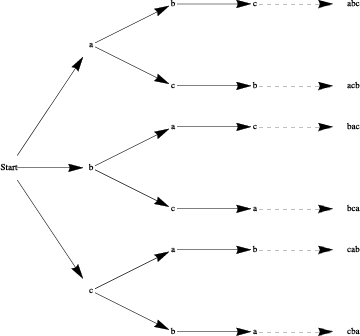Consider only the digits 1, 2, 3, 4, and 5.
-
How many three-digit numbers can be formed if no repetition of digits can occur?
-
How many three-digit numbers can be formed if repetition of digits is allowed?
-
How many three-digit numbers can be formed if only non-consecutive repetition of digits are allowed?
Solutions to (a): Solution 1: Using the rule of products. We have any one of five choices for digit one, any one of four choices for digit two, and three choices for digit three. Hence,
\(5 \cdot 4 \cdot 3 = 60\) different three-digit numbers can be formed.
Solution 2; Using the permutation formula. We want the total number of permutations of five digits taken three at a time:
\begin{equation*}
P(5,3)=\frac{5!}{(5-3)!}=5 \cdot 4 \cdot 3 = 60\text{.}
\end{equation*}
Solution to (b): The definition of permutation indicates “...no two elements in each list are the same.” Hence the permutation formula cannot be used. However, the rule of products still applies. We have any one of five choices for the first digit, five choices for the second, and five for the third. So there are
\(5 \cdot 5\cdot 5 = 125\) possible different three-digit numbers if repetition is allowed.
Solution to (c): Again, the rule of products applies here. We have any one of five choices for the first digit, but then for the next two digits we have four choices since we are not allowed to repeat the previous digit So there are
\(5 \cdot 4\cdot 4 = 80\) possible different three-digit numbers if only non-consecutive repetitions are allowed.


